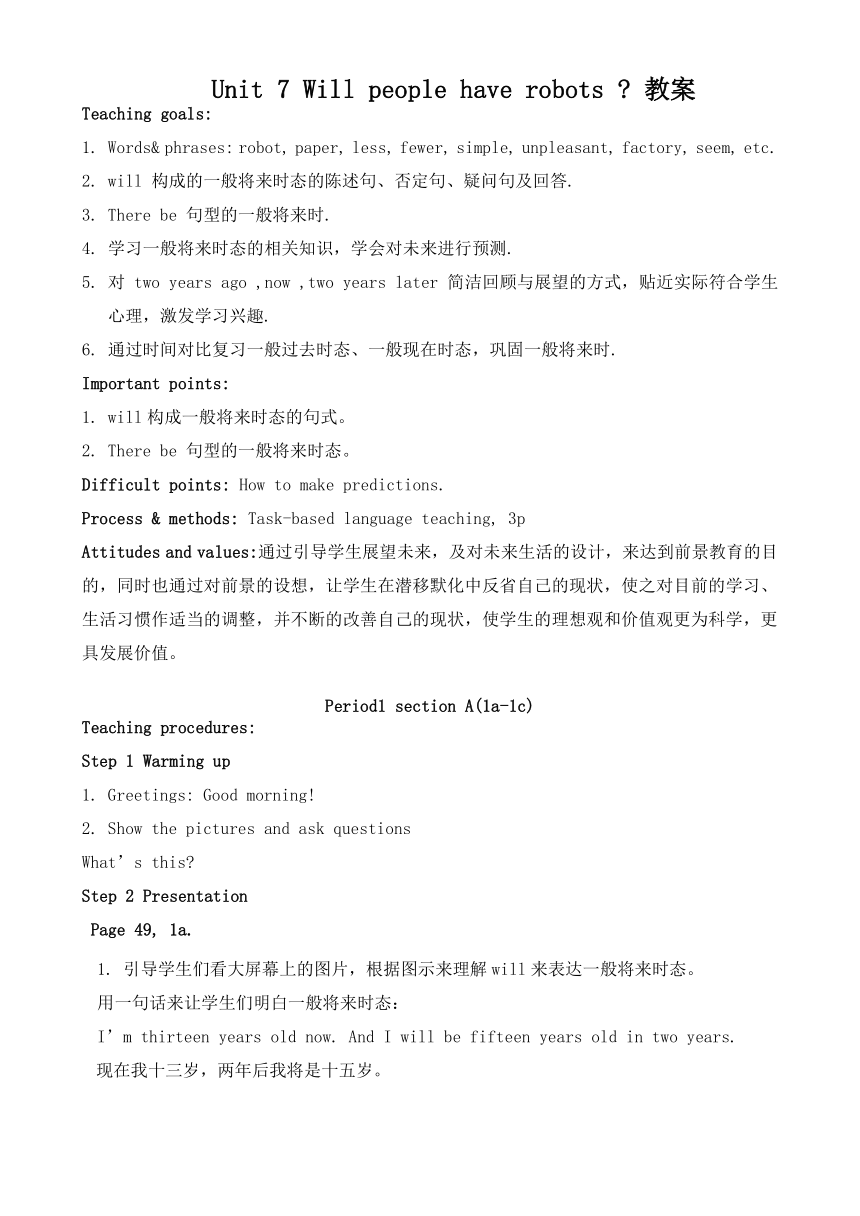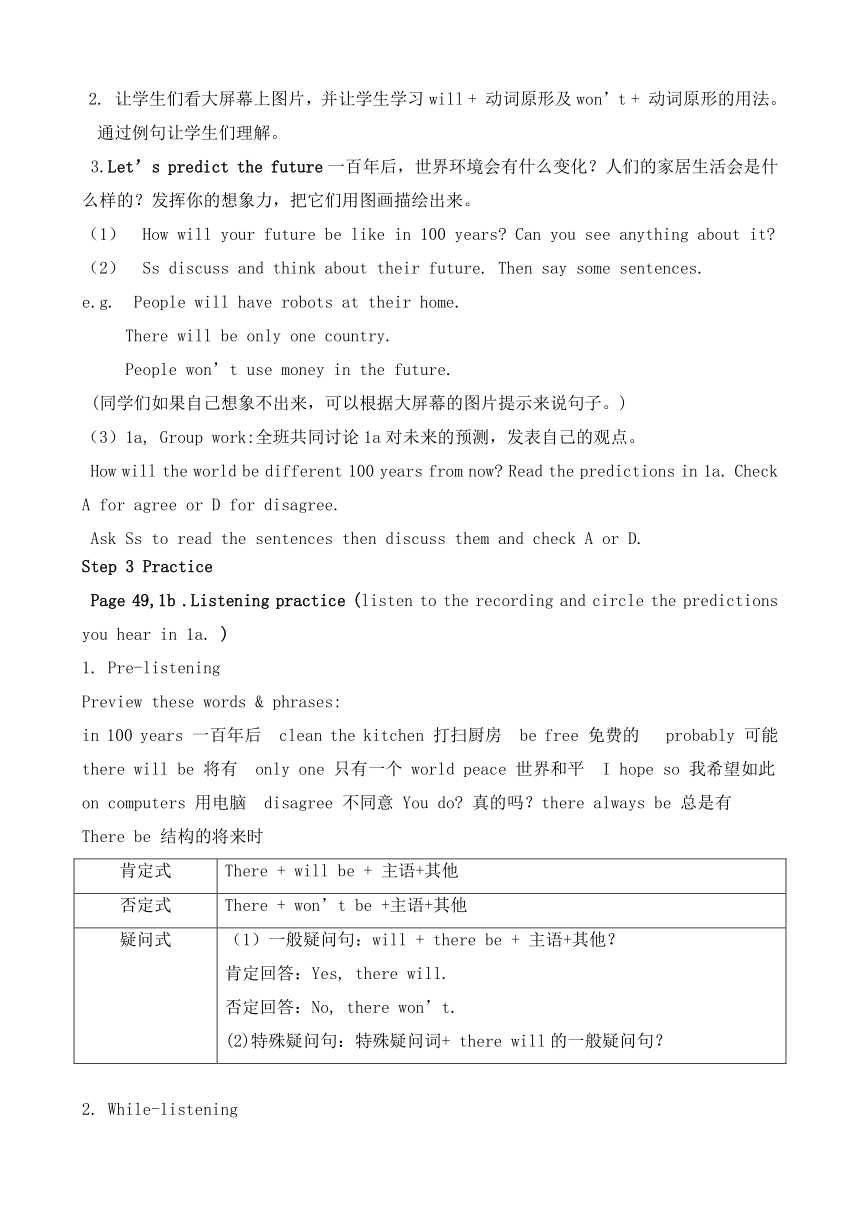八年级英语上册Unit 7 Will people have robots?教案
文档属性
| 名称 | 八年级英语上册Unit 7 Will people have robots?教案 |  | |
| 格式 | zip | ||
| 文件大小 | 84.5KB | ||
| 资源类型 | 教案 | ||
| 版本资源 | 人教新目标(Go for it)版 | ||
| 科目 | 英语 | ||
| 更新时间 | 2017-06-21 16:10:51 | ||
图片预览


文档简介
Unit
7
Will
people
have
robots
教案
Teaching
goals:
Words&
phrases:
robot,
paper,
less,
fewer,
simple,
unpleasant,
factory,
seem,
etc.
will
构成的一般将来时态的陈述句、否定句、疑问句及回答.
There
be
句型的一般将来时.
学习一般将来时态的相关知识,学会对未来进行预测.
对two
years
ago
,now
,two
years
later
简洁回顾与展望的方式,贴近实际符合学生心理,激发学习兴趣.
通过时间对比复习一般过去时态、一般现在时态,巩固一般将来时.
Important
points:
will构成一般将来时态的句式。
There
be
句型的一般将来时态。
Difficult
points:
How
to
make
predictions.
Process
&
methods:
Task-based
language
teaching,
3p
Attitudes
and
values:通过引导学生展望未来,及对未来生活的设计,来达到前景教育的目的,同时也通过对前景的设想,让学生在潜移默化中反省自己的现状,使之对目前的学习、生活习惯作适当的调整,并不断的改善自己的现状,使学生的理想观和价值观更为科学,更具发展价值。
Period1
section
A(1a-1c)
Teaching
procedures:
Step
1
Warming
up
Greetings:
Good
morning!
Show
the
pictures
and
ask
questions
What’s
this
Step
2
Presentation
Page
49,
1a.
1.
引导学生们看大屏幕上的图片,根据图示来理解will来表达一般将来时态。
用一句话来让学生们明白一般将来时态:
I’m
thirteen
years
old
now.
And
I
will
be
fifteen
years
old
in
two
years.
现在我十三岁,两年后我将是十五岁。
2.
让学生们看大屏幕上图片,并让学生学习will
+
动词原形及won’t
+
动词原形的用法。通过例句让学生们理解。
3.Let’s
predict
the
future一百年后,世界环境会有什么变化?人们的家居生活会是什么样的?发挥你的想象力,把它们用图画描绘出来。
(1)
How
will
your
future
be
like
in
100
years
Can
you
see
anything
about
it
(2)
Ss
discuss
and
think
about
their
future.
Then
say
some
sentences.
e.g.
People
will
have
robots
at
their
home.
There
will
be
only
one
country.
People
won’t
use
money
in
the
future.
(同学们如果自己想象不出来,可以根据大屏幕的图片提示来说句子。)
(3)1a,
Group
work:全班共同讨论1a对未来的预测,发表自己的观点。
How
will
the
world
be
different
100
years
from
now
Read
the
predictions
in
1a.
Check
A
for
agree
or
D
for
disagree.
Ask
Ss
to
read
the
sentences
then
discuss
them
and
check
A
or
D.
Step
3
Practice
Page
49,1b
.Listening
practice
(listen
to
the
recording
and
circle
the
predictions
you
hear
in
1a.
)
Pre-listening
Preview
these
words
&
phrases:
in
100
years
一百年后
clean
the
kitchen
打扫厨房
be
free
免费的
probably
可能
there
will
be
将有
only
one
只有一个
world
peace
世界和平
I
hope
so
我希望如此
on
computers
用电脑
disagree
不同意
You
do
真的吗?there
always
be
总是有
There
be
结构的将来时
肯定式
There
+
will
be
+
主语+其他
否定式
There
+
won’t
be
+主语+其他
疑问式
(1)一般疑问句:will
+
there
be
+
主语+其他?肯定回答:Yes,
there
will.否定回答:No,
there
won’t.(2)特殊疑问句:特殊疑问词+
there
will的一般疑问句?
While-listening
The
teacher
will
play
the
tape
two
times,
please
try
your
best
to
catch
the
words!
The
first
time,
try
to
find
the
main
idea.(
“4W”
and
“1H”.)
The
second
time,
listen
sentence
by
sentence.
Post-listening
(1).Finish
the
task
in
1b.
(2).Role-play
the
conversation
on
page101.
(3).Make
conversations.
(1c)
Pair
work:对于一百年后的预测,哪些可能发生?哪些不可能发生?结合1a内容,两人一组自由讨论。讨论时可借助如下对话形式:
(1)A:Will
people
use
money
in
100
years
(2)A:
Will
there
be
one
country
B:
Yes,
they
will
/No,
they
won’t。
B:
Yes,
there
will./
No,
there
won’t.
(4)观察与思考:观察以上听力训练中所填词汇,结合1a中预测未来的句子,请你来总结:
①
表示将来发生的动作或情况应该用___
+____________来表达。其否定形式为___________+____________。你能写出它的疑问句式吗?_______________________
②
There
be
句型的一般将来时结构为______________________。
Step4
Production
Page
2,
1c.
Pair
work
Ask
Ss
to
make
conversations.
Step
5
Homework
板书设计:
教学反思:
第二课时
学习目标:学会用将来时态预言
一、课前准备:要求学生复习be
going
to
结构表将来的计划和打算。
翻译下列句子。
1、我打算下周举办生日聚会。
2、他的弟弟计划明天去北京。
3、当我长大了,我打算当一名运动员。
二、新课预习检测:
(小组合作完成)
1、Complete
the
following
words
we’ve
learned
in
this
unit.
根据本单元所学单词,补全下列单词。
r_bo_
p_p_r
m_n_y
p_ll_tion
2、Look
at
the
following
pictures
and
complete
the
dialogue.
看图,完成下列对话。
1.A:
Will
people
have
________
in
their
homes
B:
Yes,
________
________.
I
think
every
home
will
have
one.
3.练习:将下列句子译成英文。
①
一百年后人们将会拥有机器人。People
__________
________robots
in
100
years.
②
每样东西都将会免费吗?__________everything
__________
__________
三、教师导学
Explain
:一般将来时态
构成:
will
/
be
going
to
+动词原形
1、用be
going
to
do表示将来:主要意义,一是表示“意图”,即打算在最近的将来或将来进行某事。
Are
you
going
to
post
that
letter
How
long
is
he
going
to
stay
here
I
am
going
to
book
a
ticket.
另一意义是表示“预见”,即现在已有迹象表明将要发生或即将发生某种情况。
It’s
going
to
rain.
2、用will/
shall
do表示将来:
You
will
feel
better
after
taking
this
medicine
I
will
not
lend
the
book
to
you.
She
will
come
to
have
class
tomorrow.
Will
she
come
to
have
class
tomorrow
Yes,she
will/
No.she
won’t
She
won’t
come
to
have
class
tomorrow.
提醒学生注意划线部分的特点。由此总结出一般将来时的结构为:
1、助动词will+动词原形
,
2、变一般疑问句,直接把will提到句首。
3、变否定句直接在will后加not
四、练习巩固:
Form
sentences.
组句(请注意大小写和标点符号)。
1.on
paper,
books,
on
computers,
not,
be,
only,
will
________________________________________________________________
2.will,
200
years
old,
to
be,
live,
will,
people
_______________________________________________________________
3.in
100
years,
won’t,
any,
be,
paper
money,
there
________________________________________________________________
五、学习体会:
7
Will
people
have
robots
教案
Teaching
goals:
Words&
phrases:
robot,
paper,
less,
fewer,
simple,
unpleasant,
factory,
seem,
etc.
will
构成的一般将来时态的陈述句、否定句、疑问句及回答.
There
be
句型的一般将来时.
学习一般将来时态的相关知识,学会对未来进行预测.
对two
years
ago
,now
,two
years
later
简洁回顾与展望的方式,贴近实际符合学生心理,激发学习兴趣.
通过时间对比复习一般过去时态、一般现在时态,巩固一般将来时.
Important
points:
will构成一般将来时态的句式。
There
be
句型的一般将来时态。
Difficult
points:
How
to
make
predictions.
Process
&
methods:
Task-based
language
teaching,
3p
Attitudes
and
values:通过引导学生展望未来,及对未来生活的设计,来达到前景教育的目的,同时也通过对前景的设想,让学生在潜移默化中反省自己的现状,使之对目前的学习、生活习惯作适当的调整,并不断的改善自己的现状,使学生的理想观和价值观更为科学,更具发展价值。
Period1
section
A(1a-1c)
Teaching
procedures:
Step
1
Warming
up
Greetings:
Good
morning!
Show
the
pictures
and
ask
questions
What’s
this
Step
2
Presentation
Page
49,
1a.
1.
引导学生们看大屏幕上的图片,根据图示来理解will来表达一般将来时态。
用一句话来让学生们明白一般将来时态:
I’m
thirteen
years
old
now.
And
I
will
be
fifteen
years
old
in
two
years.
现在我十三岁,两年后我将是十五岁。
2.
让学生们看大屏幕上图片,并让学生学习will
+
动词原形及won’t
+
动词原形的用法。通过例句让学生们理解。
3.Let’s
predict
the
future一百年后,世界环境会有什么变化?人们的家居生活会是什么样的?发挥你的想象力,把它们用图画描绘出来。
(1)
How
will
your
future
be
like
in
100
years
Can
you
see
anything
about
it
(2)
Ss
discuss
and
think
about
their
future.
Then
say
some
sentences.
e.g.
People
will
have
robots
at
their
home.
There
will
be
only
one
country.
People
won’t
use
money
in
the
future.
(同学们如果自己想象不出来,可以根据大屏幕的图片提示来说句子。)
(3)1a,
Group
work:全班共同讨论1a对未来的预测,发表自己的观点。
How
will
the
world
be
different
100
years
from
now
Read
the
predictions
in
1a.
Check
A
for
agree
or
D
for
disagree.
Ask
Ss
to
read
the
sentences
then
discuss
them
and
check
A
or
D.
Step
3
Practice
Page
49,1b
.Listening
practice
(listen
to
the
recording
and
circle
the
predictions
you
hear
in
1a.
)
Pre-listening
Preview
these
words
&
phrases:
in
100
years
一百年后
clean
the
kitchen
打扫厨房
be
free
免费的
probably
可能
there
will
be
将有
only
one
只有一个
world
peace
世界和平
I
hope
so
我希望如此
on
computers
用电脑
disagree
不同意
You
do
真的吗?there
always
be
总是有
There
be
结构的将来时
肯定式
There
+
will
be
+
主语+其他
否定式
There
+
won’t
be
+主语+其他
疑问式
(1)一般疑问句:will
+
there
be
+
主语+其他?肯定回答:Yes,
there
will.否定回答:No,
there
won’t.(2)特殊疑问句:特殊疑问词+
there
will的一般疑问句?
While-listening
The
teacher
will
play
the
tape
two
times,
please
try
your
best
to
catch
the
words!
The
first
time,
try
to
find
the
main
idea.(
“4W”
and
“1H”.)
The
second
time,
listen
sentence
by
sentence.
Post-listening
(1).Finish
the
task
in
1b.
(2).Role-play
the
conversation
on
page101.
(3).Make
conversations.
(1c)
Pair
work:对于一百年后的预测,哪些可能发生?哪些不可能发生?结合1a内容,两人一组自由讨论。讨论时可借助如下对话形式:
(1)A:Will
people
use
money
in
100
years
(2)A:
Will
there
be
one
country
B:
Yes,
they
will
/No,
they
won’t。
B:
Yes,
there
will./
No,
there
won’t.
(4)观察与思考:观察以上听力训练中所填词汇,结合1a中预测未来的句子,请你来总结:
①
表示将来发生的动作或情况应该用___
+____________来表达。其否定形式为___________+____________。你能写出它的疑问句式吗?_______________________
②
There
be
句型的一般将来时结构为______________________。
Step4
Production
Page
2,
1c.
Pair
work
Ask
Ss
to
make
conversations.
Step
5
Homework
板书设计:
教学反思:
第二课时
学习目标:学会用将来时态预言
一、课前准备:要求学生复习be
going
to
结构表将来的计划和打算。
翻译下列句子。
1、我打算下周举办生日聚会。
2、他的弟弟计划明天去北京。
3、当我长大了,我打算当一名运动员。
二、新课预习检测:
(小组合作完成)
1、Complete
the
following
words
we’ve
learned
in
this
unit.
根据本单元所学单词,补全下列单词。
r_bo_
p_p_r
m_n_y
p_ll_tion
2、Look
at
the
following
pictures
and
complete
the
dialogue.
看图,完成下列对话。
1.A:
Will
people
have
________
in
their
homes
B:
Yes,
________
________.
I
think
every
home
will
have
one.
3.练习:将下列句子译成英文。
①
一百年后人们将会拥有机器人。People
__________
________robots
in
100
years.
②
每样东西都将会免费吗?__________everything
__________
__________
三、教师导学
Explain
:一般将来时态
构成:
will
/
be
going
to
+动词原形
1、用be
going
to
do表示将来:主要意义,一是表示“意图”,即打算在最近的将来或将来进行某事。
Are
you
going
to
post
that
letter
How
long
is
he
going
to
stay
here
I
am
going
to
book
a
ticket.
另一意义是表示“预见”,即现在已有迹象表明将要发生或即将发生某种情况。
It’s
going
to
rain.
2、用will/
shall
do表示将来:
You
will
feel
better
after
taking
this
medicine
I
will
not
lend
the
book
to
you.
She
will
come
to
have
class
tomorrow.
Will
she
come
to
have
class
tomorrow
Yes,she
will/
No.she
won’t
She
won’t
come
to
have
class
tomorrow.
提醒学生注意划线部分的特点。由此总结出一般将来时的结构为:
1、助动词will+动词原形
,
2、变一般疑问句,直接把will提到句首。
3、变否定句直接在will后加not
四、练习巩固:
Form
sentences.
组句(请注意大小写和标点符号)。
1.on
paper,
books,
on
computers,
not,
be,
only,
will
________________________________________________________________
2.will,
200
years
old,
to
be,
live,
will,
people
_______________________________________________________________
3.in
100
years,
won’t,
any,
be,
paper
money,
there
________________________________________________________________
五、学习体会:
同课章节目录
- Unit 1 Where did you go on vacation?
- Section A
- Section B
- Unit 2 How often do you exercise?
- Section A
- Section B
- Unit 3 I'm more outgoing than my sister.
- Section A
- Section B
- Unit 4 What's the best movie theater?
- Section A
- Section B
- Unit 5 Do you want to watch a game show?
- Section A
- Section B
- Unit 6 I'm going to study computer science.
- Section A
- Section B
- Unit 7 Will people have robots?
- Section A
- Section B
- Unit 8 How do you make a banana milk shake?
- Section A
- Section B
- Unit 9 Can you come to my party?
- Section A
- Section B
- Unit 10 If you go to the party, you'll have a grea
- Section A
- Section B
